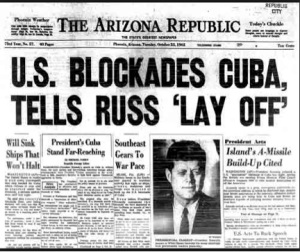| « Willful Blindness: Abraham Foxman and the Armenian Genocide | Fact Checking Scoundrel Media Lies » |
Turnabout is Fair Play - Cuba and Ukraine

Russia's response to United States and European Union efforts in Ukraine represents a more restrained, lower stakes version of the response by the U.S. to the installation of nuclear missiles in Cuba by the Union of the Soviet Socialist Republics (USSR) in 1962. Today, the headline above could be inverted to read:
Russia Blockades Ukraine, Tells US to 'Lay Off"
More than 50 years ago, U.S. President John F. Kennedy initiated a naval blockade of Cuba based on photographic evidence of medium range nuclear missile on the island just ninety miles from Florida. In his address to the nation of October 22, 1962, the president declared:
"All ships of any kind bound for Cuba from whatever nation or port will, if found to contain cargoes of offensive weapons, be turned back.
" … Any nuclear missile launched from Cuba against any nation in the Western Hemisphere as an attack by the Soviet Union on the United States, requiring a full retaliatory response upon the Soviet Union." President John F. Kennedy, Oct 22, 1962
The president closed his remarks by demanding the removal of all nuclear missiles.
The Cuban missile crisis of 1962 occurred in the context of the Cold War between the U.S. and USSR. Both nations were locked and loaded, ready to show their formidable military prowess. To many, nuclear war seemed imminent. The military wanted Kennedy to attack Cuba to eliminate the missiles. Attorney General Robert Kennedy negotiated secretly with the Russian ambassador to the U.S., Anatoly F. Dobrynin. At one point, the president's brother expressed his fear of a military take over if his brother failed to attack Cuba.
The USSR's provocation of the U.S. was a reckless move at a time when reckless moves could lead to cataclysmic war.
A secret negotiated settlement was reached between the U.S. and USSR. It defused the crisis thus allowing the continued presence of human life on the planet.
The Cuban missile crisis also brought forward the Monroe Doctrine of 1823 in which the U.S. told colonial European powers to stay out of the Western Hemisphere. President James Monroe outlined the doctrine in an address to Congress in 1823:
" … We could not view any interposition for the purpose of oppressing them [nations of Western hemisphere], or controlling in any other manner their destiny, by any European power in any other light than as the manifestation of an unfriendly disposition toward the United States." President James Monroe, December 2, 1823
U.S. and EU Provocation of Russia in Ukraine
According to Assistant Secretary of State Victoria Nuland, the successive administrations have spent $5 billion to create a Ukrainian government friendly to the U.S. and EU and hostile to Russia.
The first payoff for the $5 billion investment came with the Orange Revolution of 2004. With heavy support from the U.S. and government funded groups the Orange Revolution elected a Ukrainian government hostile to Russia. That didn't last long but the investment paid off handsomely a second time. As a result of weeks long demonstrations against the Ukrainian government in 2014, a starkly anti Russian president was installed.
Ukraine was headed to join the European Union and NATO.
The likelihood of NATO on the Russia-Ukraine border represents a direct threat to Russia.
Russian policy doesn't demand a region of influence covering an entire hemisphere as President Monroe outlined in 1823. However, when it comes to NATO troops and weapons systems on its border, Russia can be expected to act in its national interests.
Russia's arguments are obvious:
Just as the European empires of the 19th century had no business interfering in the Americas, the U.S. and EU have no business interfering in the Ukraine and other states that border Russia.
Just as the USSR had no business setting up nuclear missiles in Cuba, NATO has no business setting up military forces or installations in Ukraine.
The president, Congress, and corporate media suffer from collective amnesia regarding the Cuban missile crisis or the most cynical hypocrisy by ignoring it.
This is big power politics. It's not hard to grasp.
END
Creative Commons 3.0


